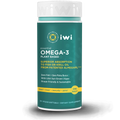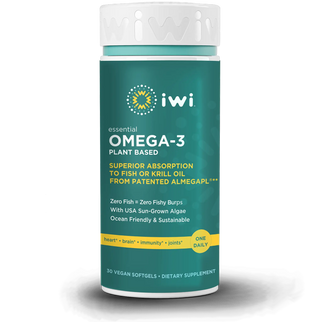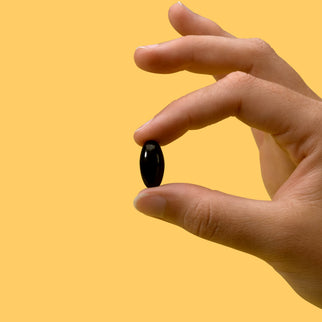Fish oil advertises a wide range of potential health benefits, so any reasonable person would want to get the most out of taking their supplements. However, many people worry that if they take fish oil at the wrong time, they may not be maximizing the potential benefits of taking the supplement.
There is still plenty of debate surrounding the best time to take fish oil, so it helps to know the facts before committing to taking fish oil supplements each day so that you know you are taking full advantage of the nutritional benefits.
What Is Fish Oil?

Fish oil is a popular supplement that is advertised as an option to support heart health and brain function, among many other benefits. This supplement is made by extracting the oils from the tissues of fatty fish like mackerel, salmon, sardines, and tuna.
The oil is then either bottled up or turned into capsules to be taken as a nutritional supplement.
What Are the Benefits of Taking Fish Oil?
With the amount of popularity that fish oil supplements have gained in the past few years, there is no doubt that there are many benefits. The benefits of taking fish oil lie almost entirely in its omega-3 content. Fish oil contains two valuable omega-3 fatty acids — docosahexaenoic acid (DHA) and eicosapentaenoic acid (EPA).
Of the three main omega-3 fatty acids, DHA and EPA are the two most valuable essential fats. Fish oil is one of the few supplements that contains both DHA and EPA omega-3 fatty acids. Aside from fish oil, the only other sources are eating fatty fish, taking krill oil, or taking algae supplements. Since there are such few sources of these nutrients, it is important to be mindful of consuming them through your diet, so supplements like these are very valuable.
Some of the benefits that come with consuming DHA and EPA include:
- Promoting healthy heart function
- Helping to maintain a healthy blood pressure
- Supporting healthy cognitive function and memory
- Helping to maintain healthy joints
- Supporting emotional wellness
Still, since these benefits come from the omega-3 content more than just the fish oil itself, you can enjoy these benefits from any source of DHA and EPA omega-3s.
What Are the Side Effects of Taking Fish Oil?
For the most part, taking fish oil is considered safe and offers few dangerous side effects. Still, there are a few side effects that could leave you uncomfortable.
Some of the potential side effects of fish oil include:
- Nausea
- Heartburn
- Indigestion
- Unpleasant fishy burps and breath
- Diarrhea
The side effects of taking fish oil become worse if you take excessive amounts, so make sure you follow the guidelines on the package of the supplement you take.
One of the biggest risks of taking fish oil comes for those who have seafood allergies. If you think you might be allergic to seafood or shellfish, be sure to consult your doctor before considering a fish oil supplement. If you notice any swelling, redness, or difficulty breathing after taking a fish oil supplement, then seek medical attention.
As you should with any supplement, consult your doctor or healthcare professional before adding fish oil supplements to your daily routine.
How Much Fish Oil Should You Take Each Day?
There are no established recommended dietary guidelines for how much fish oil you should take during the day. There are also no officially established guidelines surrounding how much DHA and EPA you should include in your diet.
However, there is some guidance so that you aren’t totally in the dark. The American Heart Association recommends eating two servings of fatty fish in your diet per week, which helps show how much omega-3 you should aim for in your diet.
To provide a clearer picture, other research supports taking between 250 and 500 mg of combined DHA and EPA omega-3 fatty acids. You don’t need to consume this amount of omega-3s every day, but taking a daily supplement can help you reach that goal throughout the week.
For example, if you take a supplement that offers 250 mg of combined EPA and DHA once daily, you will easily surpass the amount you should aim for weekly. It’s always better to take more than you need instead of less, just in case your body cannot absorb all of the nutrients and put them to use at one time.
Sticking to the serving size on the bottle of your supplement will help you keep track of how much omega-3 you are getting throughout the week. Following these guidelines will also help you ensure that you are consuming safe amounts of fish oil.
When Should You Take Fish Oil?
With a better picture of fish oil and the benefits it offers, now comes the question of when the best time of day is to take a fish oil supplement. Some argue that there are more benefits to taking fish oil in the morning, while others insist that it makes more sense to take it at night. Despite the strong desire for an answer among those who take fish oil, there doesn’t seem to be one.
Some research suggests that you can increase the absorption of fish oil supplements by taking them with a meal that includes other fats. The omega-3s in fish oil are fat soluble, which means they absorb better in the presence of other healthy fats. For example, it would be a good idea to take your daily fish oil with a meal that has foods like avocado, beans, or olive oil.
As with any supplement, it can take time for the nutrients to build up in your system and start providing the benefits that you anticipate. Therefore, make sure that you are consistent with taking it every day more so than you worry about the time of day that you choose to take fish oil. It may take six consistent weeks of taking a supplement or more before you start to see noticeable results from trying a new option.
Ultimately, you don’t need to stress about taking your fish oil at the right time but taking it consistently and with a meal that contains healthy fats can help you get the most out of your omega-3 supplements.
How To Get the Most Absorption of Your Omega-3s

When taking an omega-3 supplement, you can worry less about the science of when to take it and focus more on enjoying the benefits, especially when the science is already on your side. Fortunately, you don't have to stress about maximizing your omega-3 absorption when you choose to get your omega-3s from algae instead of fish.
Unlike the omega-3s in fish oil, which are only fat soluble, the omega-3 in Nannochloropsis algae are both fat and water soluble — this means that your body is able to absorb them better. In fact, the omega-3s in algae have a 1.7x higher absorption rate compared to those in fish or krill oil. This higher absorption rate means that your body is able to put the nutrients to work supporting your body’s various systems.
Algae offers a variety of benefits in addition to its higher absorption rate. On top of its ability to be put to use more efficiently, algae is more suitable for any lifestyle. Algae is entirely plant-based, so it is a practical option for vegans, vegetarians, or those with allergies.
Algae is also better for the environment, as it requires no fishing from the ocean and is much more sustainable to produce than fish or krill oil. Oh, and you will enjoy that algae has no fishy aftertaste or resounding fishy burps.
Get The Most Out of Your Omega-3s Every Day
By providing valuable DHA and EPA omega-3s, fish oil can offer a strong list of potential health benefits. Many people worry about taking these supplements at the right time of day, but you can maximize your absorption by taking your supplement with a meal that includes fats and staying consistent.
However, by turning to an algae supplement, you can get the same potential benefits with fewer concerns by taking comfort in the fact that your body is able to put the omega-3s to work faster and more efficiently. You can start the journey with iwi life by taking our daily omega-3 supplement.
To see all the ways you can leverage algae's powers for your health and wellness, check out our full family of omega-3 supplements.
Sources:
Fish and Omega-3 Fatty Acids | American Heart Association


















